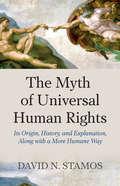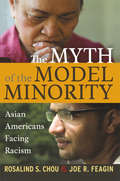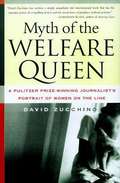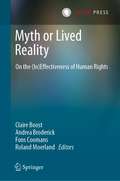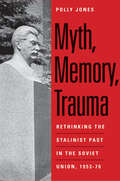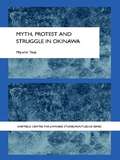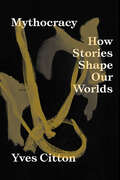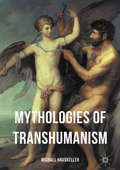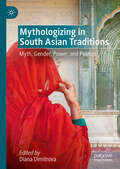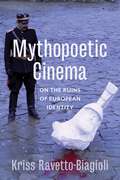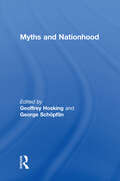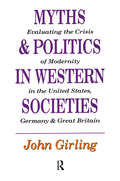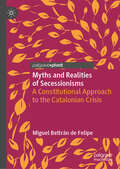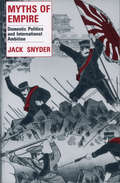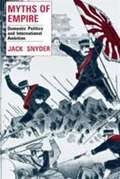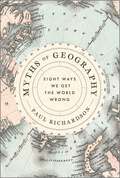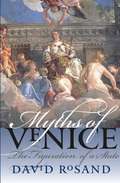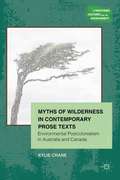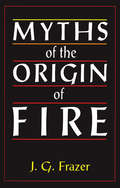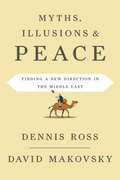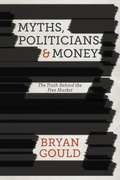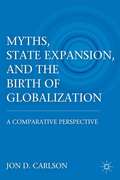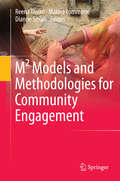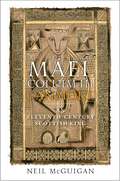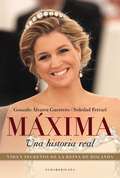- Table View
- List View
Myth of Universal Human Rights: Its Origin, History, and Explanation, Along with a More Humane Way
by David N. StamosIn this groundbreaking and provocative new book, philosopher of science David N. Stamos challenges the current conceptions of human rights, and argues that the existence of universal human rights is a modern myth. Using an evolutionary analysis to support his claims, Stamos traces the origin of the myth from the English Levellers of 1640s London to our modern day. Theoretical defenses of the belief in human rights are critically examined, including defenses of nonconsensus concepts. In the final chapter Stamos develops a method of naturalized normative ethics, which he then applies to topics routinely dealt with in terms of human rights. In all of this Stamos hopes to show that there is a better way of dealing with matters of ethics and justice, a way that involves applying the whole of our evolved moral being, rather than only parts of it, and that is fiction-free.
Myth of the Model Minority: Asian Americans Facing Racism
by Joe R. Feagin Rosalind S. ChouWith their apparent success in schools and careers, Asian Americans have long been viewed by white Americans as the "model minority." Yet few Americans realize the lives of many Asian Americans are constantly stressed by racism. This reality becomes clear from the voices of Asian Americans heard in this first in-depth book on the experiences of racism among Asian Americans from many different nations and social classes. Chou and Feagin assess racial stereotyping and discrimination from dozens of interviews across the country with Asian Americans in a variety of settings, from elementary schools to colleges, workplaces, and other public arenas. They explore the widely varied ways of daily coping that Asian Americans employ-some choosing to conform and others actively resisting. This book dispels notions that Asian Americans are universally "favored" by whites and have an easy time adapting to life in American society. The authors conclude with policy measures that can improve the lives not only of Asian Americans but also of other Americans of color.
Myth of the Welfare Queen: A Pulitzer Prize-winning Journalist's Portrait of Women on the Line
by David ZucchinoPulitzer Prize-winning reporter David Zucchino spent a year sharing the lives of Odessa Williams and Cheri Honkala -- two "welfare mothers" in Philadelphia -- to gain an intimate look at their day-to-day existence. Odessa, supporting an extended family, exhibits almost superhuman strength and resolve. Cheri, a single mother, is a tireless advocate for the homeless. Zucchino beautifully portrays them as figures of profound courage and quiet perseverance, systematically shattering all misconceptions and stereotypes about these women and so many others like them.
Myth or Lived Reality: On the (In)Effectiveness of Human Rights
by Andrea Broderick Claire Boost Fons Coomans Roland MoerlandChapters How Human Rights Cross-Pollinate and Take Root: Local Governments & Refugees in Turkey by Elif Durmuş and Human Rights Localisation and Individual Agency: From ‘Hobby of the Few’ to the Few Behind the Hobby by Tihomir Sabchev, Sara Miellet, and Elif Durmuş are available open access under a Creative Commons Attribution 4.0 International License via link.springer.comThis book seeks to explore, from a multidisciplinary perspective, whether human rights are, in fact, a myth or a lived reality. Over the years much has been said about their effectiveness or, rather, their ineffectiveness.This perceived ineffectiveness relates not only to institutional challenges at the international level, but also to national implementation mechanisms and processes. In addition, questions have arisen as to whether individuals or groups of individuals actually benefit from the normative guarantees contained in human rights law and whether human rights as legal constructs can be effectively translated into better outcomes.This volume can be distinguished from the existing literature by virtue of the fact that it not only brings together scholars at different stages of their careers, but also that it incorporates contributions that adopt different methodological perspectives and cover a variety of topics.The book should prove of great benefit to human rights researchers, human rights practitioners, NGOs and students.Claire Boost is a PhD Candidate at the Department of Criminal Law and Criminology, Maastricht University.Andrea Broderick is an Assistant Professor at the Department of International and European Law, Maastricht University.Fons Coomans is a Professor at the UNESCO Chair in Human Rights and Peace, Department of International and European Law, Maastricht University.Roland Moerland is an Assistant Professor at the Department of Criminal Law and Criminology, Maastricht University.
Myth, Memory, Trauma
by Polly JonesDrawing on newly available materials from the Soviet archives, Polly Jones offers an innovative, comprehensive account of de-Stalinization in the Soviet Union during the Khrushchev and early Brezhnev eras. Jones traces the authorities' initiation and management of the de-Stalinization process and explores a wide range of popular reactions to the new narratives of Stalinism in party statements and in Soviet literature and historiography. Engaging with the dynamic field of memory studies, this book represents the first sustained comparison of this process with other countries' attempts to rethink their own difficult pasts, and with later Soviet and post-Soviet approaches to Stalinism.
Myth, Protest and Struggle in Okinawa (The University of Sheffield/Routledge Japanese Studies Series)
by Miyume TanjiOkinawan people have developed a unique tradition of protest in their long history of oppression and marginalization. Beginning with the Ryukyu Kingdom’s annexation to Japan in the late nineteenth century, Miyume Tanji charts the devastation caused by the Second World War, followed by the direct occupation of post-war Okinawa and continued presence of the US military forces in the wake of reversion to Japan in 1972. With ever more fragmented organizations, identities and strategies, Tanji explores how the unity of the Okinawan community of protest has come to rest increasingly on the politics of myth and the imagination. Drawing on original interview material with Okinawan protestors and in-depth analysis of protest history, Myth, Protest and Struggle in Okinawa will appeal to scholars of Japanese history and politics, and those working on social movements and protest.
Mythocracy: How Stories Shape Our Worlds
by Yves CittonHarnessing the power of storytelling for political progressMythocracy examines the narrative mechanisms that script our lives through the stories we tell one another. Digging beneath common anxieties about fake news, Yves Citton looks at the attention economy, which organises our political perceptions around affective attractors. These are much more powerful than the truth value of any given narrative. The time has come for the left to reclaim the power of myth from reactionary populism.
Mythologies of Transhumanism
by Michael HauskellerThis book examines the dependence of transhumanist arguments on the credibility of the narratives of meaning in which they are embedded. By taking the key ideas from transhumanist philosophy - the desirability of human self-design and immortality, the elimination of all suffering and the expansion of human autonomy - Michael Hauskeller explores these narratives and the understanding of human nature that informs them. Particular attention is paid to the theory of transhumanism as a form of utopia, stories of human nature, the increasing integration of the radical human enhancement project into the cultural mainstream, and the drive to upgrade from flesh to machine.
Mythologizing in South Asian Traditions: Myth, Gender, Power, and Politics
by Diana DimitrovaThis book deals with the issue of mythologizing in South Asian traditions. It brings together a number of essays dealing with the interface between mythology, gender, politics, and nationalism. The common thread that links the chapters is the appropriation and reinterpretation of myth, and its weaponizing for the purpose of power or political gain. All chapters explore the various aspects of the ongoing process of re-mythologizing of the present, as revealed in South Asian traditions. The essays in this collection respond to the same question: how to interpret the present? What is the meaning of ancient and venerated myths today? What are the ideological implications of the interpretation of myths and how do they reflect and influence the power structures of contemporary societies in South Asia?
Mythopoetic Cinema: On the Ruins of European Identity
by Kriss Ravetto-BiagioliIn Mythopoetic Cinema, Kriss Ravetto-Biagioli explores how contemporary European filmmakers treat mythopoetics as a critical practice that questions the constant need to provide new identities, a new Europe, and with it a new European cinema after the fall of the Soviet Union. Mythopoetic cinema questions the perpetual branding of movements, ideas, and individuals. Examining the work of Jean-Luc Godard, Alexander Sokurov, Marina Abramović, and Theodoros Angelopoulos, Ravetto-Biagioli argues that these disparate artists provide a critical reflection on what constitutes Europe in the age of neoliberalism. Their films reflect not only the violence of recent years but also help question dominant models of nation building that result in the general failure to respond ethically to rising ethnocentrism.In close readings of such films as Sokurov's Russian Ark (2002) and Godard's Notre Musique (2004), Ravetto-Biagioli demonstrates the ways in which these filmmakers engage and evaluate the recent reconceptualization of Europe's borders, mythic figures, and identity paradoxes. Her work not only analyzes how these filmmakers thematically treat the idea of Europe but also how their work questions the ability of the moving image to challenge conventional ways of understanding history.
Myths and Nationhood
by George Schöpflin Geoffrey HoskingFirst Published in 1997. Routledge is an imprint of Taylor & Francis, an informa company.
Myths and Politics in Western Societies: Evaluating the Crisis of Modernity in the United States, Germany, and Great Britain
by John Girling"In an intriguing and provocative bookan important thesis. An important addition to libraries serving both academic and general readers."--Choice
Myths and Realities of Secessionisms: A Constitutional Approach to the Catalonian Crisis
by Miguel Beltrán de FelipeThis book provides a comprehensive overview of the Catalonian crisis in Spain from a historical, political and legal perspective. Using the precedents of Québec, Scotland, and partially Veneto and Bavaria, the author highlights some of the key issues of contemporary secessionist nationalism, including its relationship with sovereignty, the right to have a referendum, and the capacity of a particular territory to amend the constitution in order to admit secession.
Myths of Empire
by Jack SnyderOverextension is the common pitfall of empires. Why does it occur? What are the forces that cause the great powers of the industrial era to pursue aggressive foreign policies? Jack Snyder identifies recurrent myths of empire, describes the varieties of overextension to which they lead, and criticizes the traditional explanations offered by historians and political scientists. He tests three competing theories-realism, misperception, and domestic coalition politics-against five detailed case studies: early twentieth-century Germany, Japan in the interwar period, Great Britain in the Victorian era, the Soviet Union after World War II, and the United States during the Cold War. The Resulting insights run counter to much that has been written about these apparently familiar instances of empire building.
Myths of Empire: Domestic Politics and International Ambition
by Jack SnyderOverextension is the common pitfall of empires. Why does it occur? What are the forces that cause the great powers of the industrial era to pursue aggressive foreign policies? Jack Snyder identifies recurrent myths of empire, describes the varieties of overextension to which they lead, and criticizes the traditional explanations offered by historians and political scientists. He tests three competing theories-realism, misperception, and domestic coalition politics-against five detailed case studies: early twentieth-century Germany, Japan in the interwar period, Great Britain in the Victorian era, the Soviet Union after World War II, and the United States during the Cold War. The Resulting insights run counter to much that has been written about these apparently familiar instances of empire building.
Myths of Geography: Eight Ways We Get the World Wrong
by Paul RichardsonIs geography really destiny? Our maps may no longer be stalked by dragons and monsters, but our perceptions of the world are still shaped by geographic myths. Myths like Europe being the center of the world. Or that border walls are the solution to migration. Or that Russia is predestined to threaten its neighbors. In his punchy and authoritative new book, Paul Richardson challenges recent popular accounts of geographical determinism and shows that how the world is represented often isn't how it really is—that the map is not the territory. Along the way we visit some remarkable places: Iceland's Thingvellir National Park, where you can swim between two continents, and Bir Tawil in North Africa, one of the world's only territories not claimed by any country. We follow the first train that ran across Eurasia between Yiwu in east China and Barking in east London, and scale the US-Mexico border wall to find out why such fortifications don&’t work. Written with verve and full of quotable facts, Myths of Geography is a book that will turn your world upside down.
Myths of Venice: The Figuration of a State
by David Rosand<p>Over the course of several centuries, Venice fashioned and refined a portrait of itself that responded to and exploited historical circumstance. Never conquered and taking its enduring independence as a sign of divine favor, free of civil strife and proud of its internal stability, Venice broadcast the image of itself as the Most Serene Republic, an ideal state whose ruling patriciate were selflessly devoted to the commonweal. All this has come to be known as the "myth of Venice." <p>Exploring the imagery developed in Venice to represent the legends of its origins and legitimacy, David Rosand reveals how artists such as Gentile and Giovanni Bellini, Carpaccio, Titian, Jacopo Sansovino, Tintoretto, and Veronese gave enduring visual form to the myths of Venice. He argues that Venice, more than any other political entity of the early modern period, shaped the visual imagination of political thought. This visualization of political ideals, and its reciprocal effect on the civic imagination, is the larger theme of the book.</p>
Myths of Wilderness in Contemporary Narratives
by Kylie CraneThe concept of 'wilderness' as a foundational idea for environmentalist thought has become the subject of vigorous debates. Myths of Wilderness in Contemporary Narratives offers a taxonomy of the forms that wilderness writing has taken in Australian and Canadian literature, re-emphasizing both country's origins as colonies.
Myths of the Origin of Fire
by Sir James FrazerSir James G. Frazer (1854-1941) is famous as the author of The Golden Bough, but his work ranged widely across classics, cultural history, folklore and literary criticism as well as anthropology. A Fellow of Trinity College, Cambridge, for 62 years, Sir James G. Frazer devoted his life to research. This volume was first published in 1930.
Myths, Illusions, and Peace
by Dennis RossTwo experts debunk misconceptions about the Middle East and set clear-eyed policies for the future Why has the United States consistently failed to achieve its strategic goals in the Middle East? According to Dennis Ross and David Makovsky, two of America's leading experts on the region, it is because we have been laboring under false assumptions, or mythologies, about the nature and motivation of Middle East countries and their leaders. In Myths, Illusions, and Peace, the authors debunk these damaging fallacies, held by both the right and the left, and present a concise and far-reaching set of principles that will help America set an effective course of action in the region. Among the myths that the authors show to be false and even dangerous is the idea that Israeli-Palestinian peace is the key to solving all the Middle East's problems; that regime change is a prerequisite for peace and democracy; and that Iran's leadership is immune from diplomatic and economic pressure. These and other historic misunderstandings have generated years' worth of failed policies and crippled America's ability to make productive decisions in this volatile part of the world, a region that will hold the key to our security in the twenty-first century. Ross and Makovsky offer a critical rethinking of American perceptions at a time of great import and change.
Myths, Politicians and Money
by Bryan GouldRIPPING THE LID OFF THE MYTH OF THE FREE MARKET 'TRIUMPH' Many of us are increasingly puzzled and angered by the problems that government seems unable to resolve. Recent revelations by whistle-blowers only add to the sense that powerful forces control our lives and that we have no say in what they decide. There is, in general, a distinct loss in confidence in the democratic process. In MYTHS, POLITICIANS & MONEY, former Shadow Chief Secretary to the Treasury Bryan Gould casts new light on these issues. Using examples of his involvement with many of the pressing political and economic issues that have troubled governments in the West over the last four decades, Gould shows that these problems have a common cause: the surrender of our democracy to those who control and dominate the global economy. MYTHS, POLITICIANS & MONEY exposes why politicians around the world distort economic policy against the interest of ordinary people, how neo-liberalism has been allowed to rise to prominence and why the break-down of a European super-state will create economic stability for millions. Controversial and shocking, this is the insider story of the rise of the free market ideology, its entrenchment within politics and the terrible impact that it has had on society.
Myths, State Expansion, and the Birth of Globalization
by Jon D. CarlsonMany of the present problems of 'globalization' are mirrored in the historical expansion of the European state system. This title is a structured, comparative case study analysis of four regions and examines how these regions and their peoples were absorbed into the expanding European-centered state system from roughly the 1400s through to 1800.
M² Models and Methodologies for Community Engagement
by Dianne Smith Marina Lommerse Reena TiwariHow can we engage communities? What is empowerment? To what extent should the project process be participatory? How is an outsider-insider relationship handled? How do researchers negotiate with the hegemony of western cultural interpretations? How are organizational and contextual influences handled in a project? What leadership demands do such projects place on researchers? What is capacity building? What are creative leaders and creative communities? How does the researcher journey from their studio to the situation? M² Models and Methodologies for Community Engagement discusses key theoretical constructs -- community engagement, capacity building, and community empowerment -- in order to demonstrate how theory and practice are relevant to the development of forms of community involvement. The book maps the attributes of community based projects by moving beyond simply bringing people together from a variety of disciplines, and taking an approach which is transdisciplinary and applicable across cultures and genres. Here, all people -- including the community -- are ongoing contributors, and can freely move between their own and others' discipline-specific arenas. M² differs from and extends on other works in this field of practice and research, in that its transdisciplinary, collaborative approach positions the community as a particular kind of discipline to create real change in diverse locations and fields of experience. The book is in itself a model of community engagement, as the researchers have formed a community of research and practice for change, and have developed a transformative model for community engagement that is greater than the sum of its parts - hence M². M² offers a valuable resource for students, researchers, academics, practitioners, policy developers and volunteers from the fields of architecture, interior architecture, health, planning, anthropology, education, home economics, communication, political studies and development studies.
Máel Coluim III, 'Canmore': An Eleventh-Century Scottish King
by Neil McGuiganA study of the life and times of the great king known for his role in Macbeth&’s downfall, his marriage to St. Margaret, and his dealings with the Normans. The legendary Scottish king Máel Coluim III, also known as &“Malcolm Canmore,&” is often held to epitomize Scotland&’s &“ancient Gaelic kings.&” But Máel Coluim and his dynasty were in fact newcomers, and their legitimacy and status were far from secure at the beginning of his rule. Máel Coluim&’s long reign from 1058 until 1093 coincided with the Norman Conquest of England, a revolutionary event that presented great opportunities and terrible dangers. Although his interventions in post-Conquest England eventually cost him his life, the book argues that they were crucial to his success as both king and dynasty-builder, creating internal stability and facilitating the takeover of Strathclyde and Lothian. As a result, Máel Coluim left to his successors a territory that stretched far to the south of the kingship&’s heartland north of the Forth, like the Scotland we know today. This book explores the wider political and cultural world in which Máel Coluim lived, guiding the reader through the pitfalls and possibilities offered by the sources that mediate access to that world. Our reliance on so few texts means that the eleventh century poses problems that historians of later eras can avoid. Nevertheless, Scotland in Máel Coluim&’s time generated unprecedented levels of attention abroad and more vernacular literary output than at any time prior to the Stewart era.
Máxima (Edición Actualizada): Una historia real
by Soledad Ferrari Gonzalo Alvarez GuerreroLa edición actualizada del libro que cuenta la verdadera historia de la argentina que llegó a ser reina de Holanda. Máxima, la flamante reina de Holanda, es la moderna protagonista de una increíble historia de amor e intrigas palaciegas en la cual no faltan internas políticas, traiciones, sacrificios y una descarnada lucha por el poder. Con su arma más eficiente -la sonrisa que la hizo famosa- y explotando su espontaneidad justo hasta el límite donde el protocolo lo permite, Máxima logró enamorar al príncipe Willem Alexander, cautivar a la reina Beatrix y convertirse en la personalidad más popular de Holanda, superando incluso a su marido. En este libro encontrará a la verdadera Máxima: la que luchó toda su vida contra la balanza y las presiones maternales. La que nunca ocultó sus ambiciones. La que, bajo la tutela de su suegra Beatrix, aprendió a esconder su pasado, dejando atrás una infancia de clase media alta en Barrio Norte para mudarse de castillo en castillo, disfrutando de una fortuna familiar estimada en cinco mil millones de dólares pero padeciendo, a la vez, los rigores de la -jaula de oro- que se cierne sobre ella.
